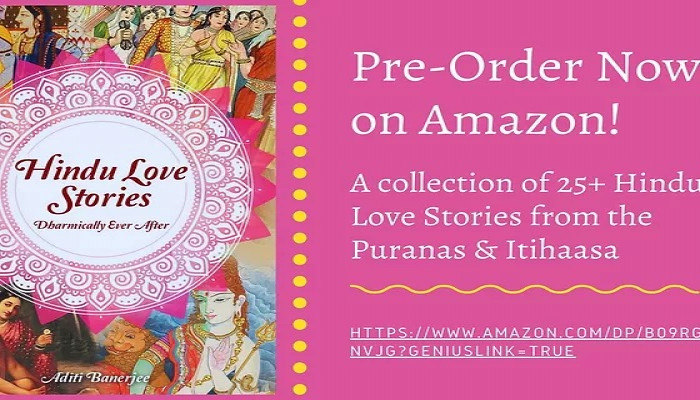Book Review: Hindu Love Stories
- In Book Reviews
- 11:00 AM, Feb 23, 2022
- Sola Raghu Ram
Dharmically ever after….
When we think of great love stories, our minds think of tales that are full of passion, desire, and sorrow. Stories in which we wish for the characters to unite for a happily ever after. And we weep when that does not happen.
Love is not a foreign concept to Hinduism, as one might presume. But the Hindu concept of love does not exactly fit with the popular standards. Hindu scriptures like Ithihasas and Puranas are full of many stories that might not seem like love stories. These are the tales of love that stood firm against the test of time. These stories are simple to read and yet not so simple to understand. The author Aditi Banerjee did a stellar job narrating many such stories in a simple and easy manner while retaining their essence. Even the popular love stories in Hindu scriptures are not popular in their true-self. This book revisits some of those stories and explores them with the traditional views.
This book is a collection of twenty-seven Hindu love stories with ten themes. A culmination of years of teachings passed on to us by Rishis. Each theme explores an idea of love in accordance with the Hindu Puruṣārthas, and ample stories are narrated for each theme.
When Vision said, “What is grief if not love persevering” I felt sorry for Wanda. Even with a single sentence, that episode clearly captured what I perceived to be the essence of love. Perhaps Vision was thinking of the story of Radha and Bumblebee when he said that.
Throughout these stories, we can see many themes of love that have given birth to many schools of thought. The author has beautifully crafted ten such themes of love through a collection of different stories.
Rama had to forsake Sita for his subjects. It is often viewed as a Dharmic act but not an act of love. But what if the seeds of his love for Sita is in Dharma itself? In Hinduism, the concept of love is not independent but is entwined with other Puruṣārthas.
We are familiar with the concept of love at first sight. Consider the story of Krishna and Rukmini. She falls in love with Krishna by merely hearing about him. She did not love him for his looks or his behaviour towards her, but his Dharmic aspects which is apparent from her message of love, beautifully narrated in Srimad Bhagavata and in this book.
Separation is considered to be the most painful process of any relationship, but think of Radha, whose love for Krishna grew through separation and suffered despair when she was with him for the fear of separation.
Consider the story of Savitri. We are familiar with the story of how she confronted Yama Deva, but do you know she chose to marry him despite knowing full well about his impending death? Or of Bhamati, who married Vachaspati Mishra despite knowing full well that he will take Sanysa after writing commentaries on the Brahma Sutras. One must wonder what prompted them to voluntarily choose such a painful life?
My favourite story in the book is of Hemachuda and Hemalekha. Hemalekha makes it her mission to set Hemachuda on the right path and, through her love, both of them rise together.
This book pleasantly challenges one’s notion of what love is and isn’t. It explores many familiar and unfamiliar stories in an abridged form while staying true to the original sources.
This book has the central theme of love, but the stories explored in the book are not typical romantic stories. As stated earlier, Hindu concept of love does not fit the modern standards. The author has written these stories in such a way that she didn’t allow the stories to be diluted by love, but rather reinforced them with it. These stories were not romanticized to fit the popular definition of love, but proudly celebrates its roots.
The author, maintained a smooth narrative flow. She speaks directly through her words. The book is precise and does not deviate. The language is simple and easy to comprehend.
I would recommend this book for anyone who wishes to read ‘Hindu love stories’ that stay true to the Hindu sacred texts while retaining the teachings of acharyas.
Image source: www.aditibanerjee.com







Comments